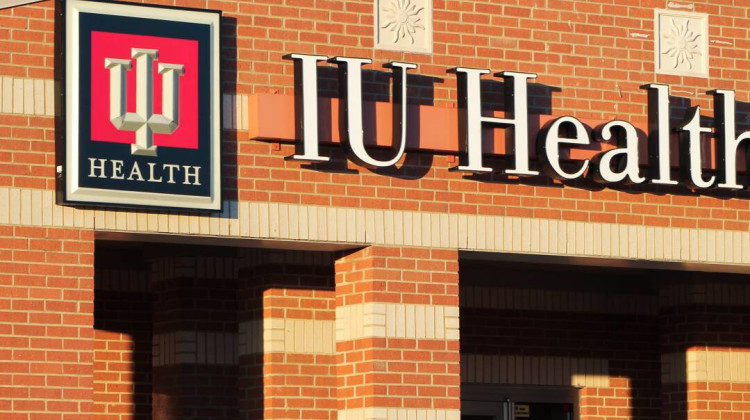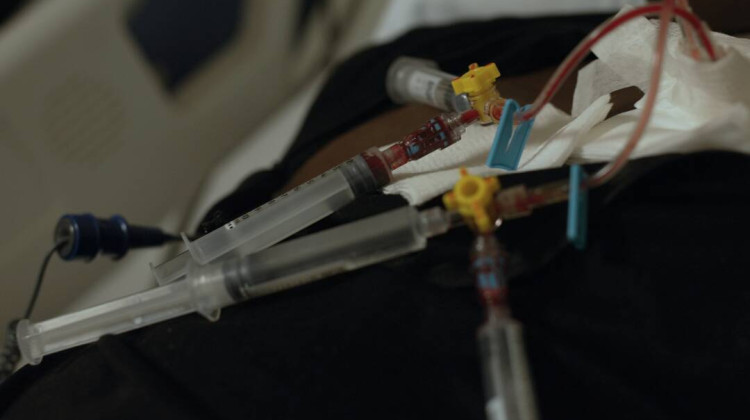
Abortion laws are affecting how physicians treat pregnancy loss, according to a year-long investigation by ProPublica.
Pexels / PixabayOne out of every four known pregnancies ends in a miscarriage. Miscarriages often resolve on their own, but some lead to dangerous complications.
Abortion laws are affecting how physicians treat pregnancy loss, according to a year-long investigation by ProPublica.
So, The Checkup’s question is: What do pregnant patients and their loved ones who live in states with abortion restrictions or bans need to know to prepare in case of an emergency?
Side Effects Public Media’s community engagement specialist Lizzy McGreevy spoke with ProPublica reporter Lizzie Presser to find out.
This transcript has been edited for length, style and clarity.
Lizzy McGrevy: What are some of the common miscarriage scenarios, and how do these abortion bans complicate this type of treatment?
Lizzie Presser: Most miscarriages occur in the first trimester and most resolve on their own. But some women choose or need an intervention, whether that's medication intervention like misoprostol and mifepristone, or a procedural intervention like a D&C in the first trimester.
A D&C is kind of a misnomer. It stands for dilation and curettage. We no longer use curettage. These days, a doctor will insert a straw-like tube into the uterus and gently suction out any remaining pregnancy tissue, and that allows the uterus to close. It's more commonly and accurately referred to as a uterine aspiration.
And a D&E is kind of the second trimester version of a D&C, which uses suction and also some tools to remove any pregnancy tissue.
But these procedures are the same procedures used in abortions. So, the same procedure that would be used for a woman who's experiencing a miscarriage but hasn't passed all of the tissue would be used if she elected to terminate her pregnancy. And this is where you get into a bit of a gray area with these laws, and doctors can become very nervous to intervene, especially when there are criminal penalties, given that any intervention could also be defined as providing an abortion.
McGrevy: You spoke with scores of doctors and patients who have been through shocking experiences and dealing with pregnancy care. Can you give us some examples of that please?
Presser: Of course. So, we recently wrote about a woman named Porsha Ngumezi who lived in Houston. She was 11 weeks pregnant and noticed that she was bleeding, and when it got worse, her O-B told her to go to a hospital. And so, she went to an emergency room. She already had a blood clotting disorder and her bleeding got worse. She was passing clots the size of grapefruits.
In these instances, when we shared details of Porsha’s circumstances with medical experts across the country, they said that it's a really simple fix: You provide a woman like Porsha with a D&C.
But that's not what happened in her care.
Instead, she waited for hours for an O-B to come see her, and when an O-B did, he suggested some blood transfusions and also a drug called misoprostol. He said that that was the hospital's protocol. And in that moment, according to Porsha’s husband Hope, who was sitting with her, they were steered toward what wouldn't have been standard of care before the abortion bans passed in Texas.
She took the pills because she trusted her doctor, and several hours later she died.
McGrevy: Is there any indication that this could also be happening here in the Midwest?
Presser: There's every indication that this is also happening in abortion ban states in the Midwest. There is no statewide effort in any state that we have heard of that is trying to find complications that have followed abortion bans for pregnant women, and there's no federal effort either.
But because the laws in the Midwest are so similar to the laws in states like Georgia and Texas, we expect that they're seeing the same kinds of pregnancy complications and deaths following abortion bans.
McGrevy: Lizzie, this is all very alarming. It's obviously not super realistic for women to relocate out of their home states once they become pregnant. So, what are some steps that patients or loved ones can take to prepare for an emergency?
Presser: Some of the things we write about are questions that you can ask an O-B as you're trying to find one to take care of you once you discover that you're pregnant.
Questions like: Would you offer a procedure –– a D&C or a D&E –– if I were miscarrying?
We also heard from medical experts who said it's important to talk to your doctors about what to do in the case of miscarriage and to make a plan –– what hospital will you go to?
There's some reason to believe that hospitals with academic affiliations are going to be better protected in these states, whereas hospitals with religious affiliations may be less likely to perform procedures that might be deemed abortion care.
Once you have that plan, you can also talk to hospitals that you plan to go to about their policies –– ask for miscarriage management policies. See if they provide procedures or offer procedures in the case of miscarriage in the first or second trimester.
And then when miscarrying, it's really important to be able to ask what's going on of your doctors and to ask for the care that you want according to standard medical practice in the case of a miscarriage.
Your doctor should be offering you three options:
- Watch and wait, also called expectant management, where you just see if your body will resolve the pregnancy and resolve the pregnancy loss on its own.
- Medication management, which will speed up the process in some cases.
- Procedural management like D&Cs and D&Es.
And you want to make sure that you are being offered all of those options, and if not asking, why not?
McGrevy: And how can a patient advocate for themselves if they're just still not receiving that care they need?
Presser: I think many patients don't realize that they can be advocates for themselves or bring an advocate with them to the hospital when they're there.
Hospitals have procedures for escalating concerns about care.
So, you can:
- If one doctor is saying that they won't provide you a procedure like a D&C, to ask, is there another doctor here who might provide this care?
- Ask for a transfer –– if you're stable enough –– to a hospital that will provide you with the care that you want.
- Ask to talk with patient advocates.
- Ask for an ethics consult.
- Ask to meet with the legal team to discuss why you aren't getting the care that you want and that you're choosing for yourself.
- Show doctors the standard of care. On our website, in our guide, we provide links to the standard of care that you can pull up and talk to with your providers.
McGrevy: Lizzie, thank you so much for this great information. If you, dear listener, want to learn more, you can read Lizzie’s piece on propublica.org. It offers a lot of great information for pregnant patients. And if you have questions about health or the healthcare system, let us know. Until next time, stay safe.
The Checkup by Side Effects Public Media is a regular audio segment on WFYI's daily podcast, WFYI News Now.
Side Effects Public Media is a health reporting collaboration based at WFYI in Indianapolis. We partner with NPR stations across the Midwest and surrounding areas — including KBIA and KCUR in Missouri, Iowa Public Radio, Ideastream in Ohio and WFPL in Kentucky.
 DONATE
DONATE






 Support WFYI. We can't do it without you.
Support WFYI. We can't do it without you.